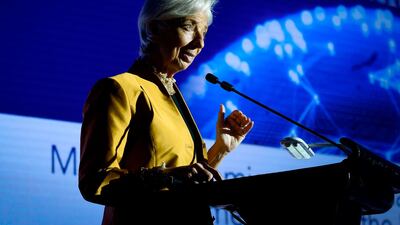Policymakers should keep an open mind towards crypto assets and work towards an even-handed regulatory framework that minimises risks and allows creativity to flourish, International Monetary Fund managing director Christine Lagarde said on Monday.
In a blog posted on the IMF website, Ms Lagarde outlined “the promise” that the 1,600 crypto assets currently in circulation can offer and encouraged regulators to view them in both a positive and negative light.
“A judicious look at crypto-assets should lead us to neither crypto-condemnation nor crypto-euphoria,” said Ms Lagarde. “Just as a few technologies that emerged from the dot-com era have transformed our lives, the crypto-assets that survive could have a significant impact on how we save, invest and pay our bills.”
However, the IMF head said that before crypto assets can transform financial activity in a lasting way, they must earn the confidence and support of consumers and authorities.
“An important initial step will be to reach a consensus within the global regulatory community on the role crypto assets should play. Because crypto assets know no boundaries, international cooperation will be essential,” said Ms Lagarde, adding that a consistent regulatory approach will help to protect consumers and investors.
______________
Read more:
A crypto asset backed by diamonds launches in Dubai
'It was fun but I would never do it again’: UAE Bitcoin investors confess
Bitcar - a cryptocurrency that allows you to own an exotic car
A golden crypto currency you can invest in for as little as $45
______________
Her comments come as policymakers look to draw up new rules around digital coins to better regulate the space. Rules can vary wildly by country, given a lack of global coordination among authorities. Japan, for example, introduced a licensing system for digital-asset exchanges last year, while Hong Kong has a more hands-off approach, only warning crypto platforms to avoid trading anything that qualifies as a security without permission.
Ms Lagarde said the potential benefits of crypto assets include their ability to enable fast and inexpensive transactions via the blockchain technology, something central banks could look to provide if digital forms of money remain risky and unstable.
“The underlying technology of crypto assets - distributed ledger technology, or DLT - could help financial markets function more efficiently,” said Ms Lagarde. “Self-executing and self-enforcing 'smart contracts' could eliminate the need for some intermediaries.”
A new report from Moody's Investors Service, released on Monday, found that blockchain technology has the potential to significantly reduce the costs and time involved in cross-border banking transactions, increasing banks' efficiency. However, those efficiencies could also put pressure on bank revenues.
"Blockchain has the potential to substantially change how a wide range of financial services are executed," said Colin Ellis, Moody's managing director of credit strategy and the report's co-author.
"But the adoption of these technologies will also limit processing fees, commissions and gains on foreign exchange transactions, which will pressure revenue."
Ms Lagarde said blockchain technology also offers secure and important storage capabilities for certain industries, such as healthcare, which could benefit from the technology for medical data.
The former French finance minister stressed that the fintech revolution will not eliminate the need for traditional brokers and bankers. However, the financial system could benefit from a balance between the two with "decentralised applications spurred by crypto assets" leading to a diversification of the financial landscape.
Ms Lagarde said that while crypto assets do not pose an immediate danger to the financial system, due to their relatively limited number, regulators should stay vigilant to avoid “economic shocks” should they become more mainstream.
Ms Lagarde's more positive approach to crypto assets follows another blog written by her last month that examined the industry's dark side and how policymakers must prevent them from becoming a vehicle for money laundering and terrorist financing.

